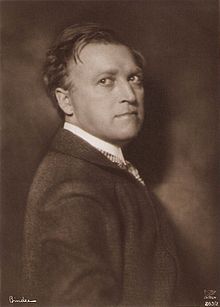Werner Krauß
| Werner Krauss | |
|---|---|

Krauss about 1920
|
|
| Born |
Werner Johannes Krauß 23 June 1884 Gestungshausen, Bavaria, Germany |
| Died | 20 October 1959 (aged 75) Vienna, Austria |
| Occupation | Actor |
| Years active | 1902–1959 |
| Spouse(s) |
Paula Saenger (m. 1908; div. 1930) Maria Bard (m. 1931; div. 1940) Liselotte Graf (m. 1940) |
| Awards |
Staatsschauspieler (1934) Goethe-Medaille für Kunst und Wissenschaft (1938) Order of Merit of the Federal Republic of Germany (1954) Iffland-Ring (1954) Decoration of Honour for Services to the Republic of Austria (1955) |
Werner Johannes Krauss (Krauß in German; 23 June 1884 – 20 October 1959) was a German stage and film actor. Regarded as one of the greatest actors of his time, Krauss dominated the German stage of the early 20th century. However, his participation in the antisemitic propaganda film Jud Süß and his collaboration with the Nazis made him a controversial figure.
Krauss was born at the parsonage of Gestungshausen near Coburg in Upper Franconia, where his grandfather was a Protestant pastor. He spent his childhood in Breslau (present-day Wrocław, Poland) and from 1901 attended the teacher's college at Kreuzburg (Kluczbork). After it became known that he worked as an extra at the Breslau Lobe-Theater, he was suspended from classes and decided to join a travelling theatre company.
In 1903 he debuted at the Guben municipal theatre. Though he never attended an acting training, he continued to play in Magdeburg, Bromberg (Bydgoszcz), at the Theater Aachen, in Nuremberg and Munich.
By the agency of Alexander Moissi, in 1913 he met the theatre director Max Reinhardt, who took Krauss to his Deutsches Theater in Berlin. However, Krauss initially only gained minor and secondary roles like King Claudius in Shakespeare's Hamlet or Mephistopheles in Goethe's Faust, wherefore after his military discharge as a midshipman of the Imperial German Navy in 1916 he also pursued a career as a film actor.
...
Wikipedia
